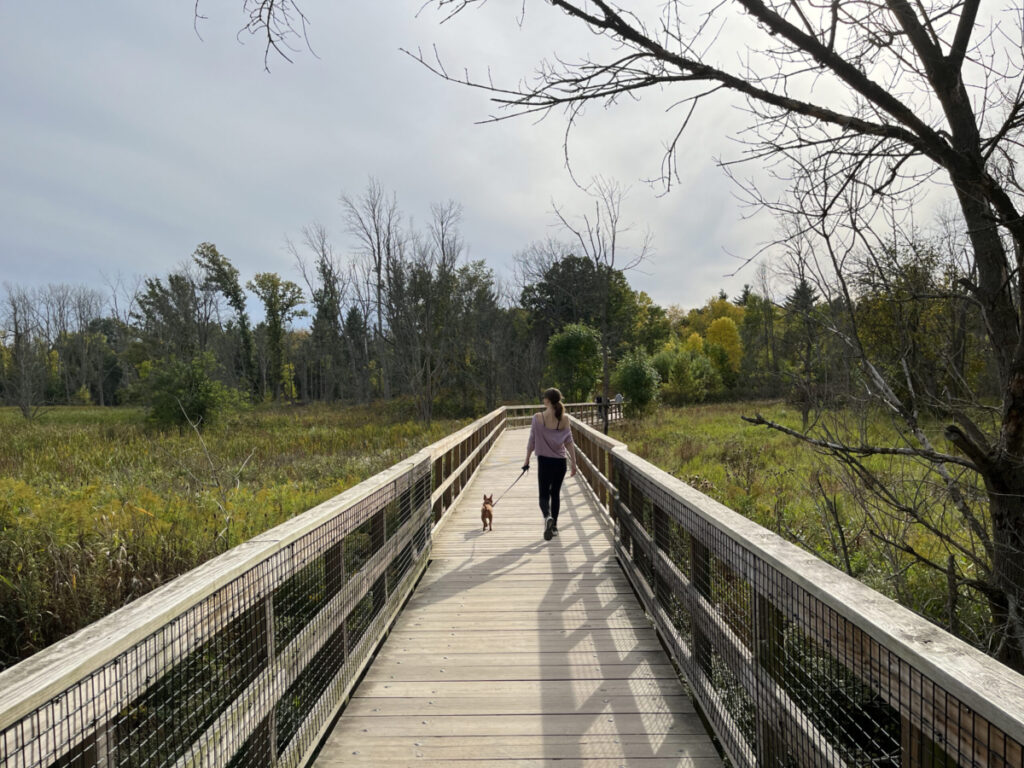
At the start of the COVID-19 pandemic, Chantal Wade couldn’t keep up with the number of mental health referrals coming out of Toronto Metropolitan University (TMU).
As a full-time therapist in trauma who loves working with students, especially around self-esteem, Wade was used to receiving a few referrals from the Centre for Student Development and Counselling. She would primarily take in students who wanted to work with a trauma therapist, those who were no longer able to access school funded counselling services or those who were on the waitlist for the school but wanted help faster.
But in 2020 her referrals increased.
“I couldn’t take these students on, but they were begging to be on my waitlist because nobody else could take them on either,” said Wade. “Nobody had availability because therapists were all jammed.”
When the pandemic hit, students were in crisis. The situation didn’t come out of nowhere. Student mental health has been on the decline for some time, happening in the background while students drummed away at their studies.
Wade was working as a crisis counsellor and, in 2005 she got her masters in social work. As social media became a facet of many people’s lives, she started noticing the negative effects it was having. Clients were constantly comparing themselves to what they saw online. It was having a detrimental impact on their self-esteem.
Post-secondary students are at a crucial time in their lives because it’s often their first time living away from home for a significant period of time and making adult choices for their futures.
“It’s a time in your life where your self-esteem becomes a product of what we have learned and shaped. And now we’re at that point where we’re learning critical thinking skills,” said Wade. “And so it’s just a very interesting time to try to kind of keep what’s been helpful and, and lose what hasn’t.”
One of the reasons Wade says students usually reach out to her is for help finding the motivation to get their work done.
“A lot of times I think they don’t recognize it’s a mental health issue when they lack motivation,” said Wade.
Corinne Hart, an associate professor in the Daphne Cockwell School of Nursing at TMU, has also noticed a deterioration of student mental health over the last 10 years.
“You certainly have more students with mental health accommodations,” Hart said. “I’m not going say it was all great before the pandemic. Students were already stressed. There were already issues with student mental health.”
Ontario Universities released a report stating that in 2016, 46 per cent of post-secondary students were feeling too depressed to fully function, up from 40 per cent in 2013. In the same year, 65 per cent of students were feeling overwhelming anxiety, up from 58 per cent in 2013.
Then, in 2019, a year before the pandemic, the National College Health Assessment released its survey of the Canadian student population. It found that 63.6 per cent of students felt things were hopeless, 88.2 per cent felt overwhelmed, and 69.6 per cent felt very lonely. More than 76 per cent felt very sad and almost 70 per cent felt overwhelming anxiety. Academic performance, followed by finances and sleep difficulties, were at the top of the list for things that were traumatic or very difficult to handle in the year prior.
So when the pandemic hit, students who were generally concerned with academics and finances were pushed to the limit. Students turned to the institution’s counselling services in search of support. What they found were waitlists.
Wade’s waitlist exploded. What usually was a two- to six-month wait turned into more than a year. She couldn’t help everyone so created a source list of services for prospective clients in need but referring people out who had been referred to her was overwhelming.
According to Student Wellbeing, the waitlist for ongoing counselling was an average of 12.7 weeks from 2019-2020. From 2021-2022, the average wait was 14.3 weeks.
“It’s a shame. I think there are a lot of students that needed support that weren’t able to get it.”
Wade says that the school experience during the pandemic was extremely challenging for students. According to her, students hear great things about what school is going to be like. But suddenly, they don’t have the opportunity to go to class, or they are masked and not making personal connections.
Then, there was the emotional aftermath.
“A lot of relationships did not make it through this time…For students living at home, family dynamics have been strained,” said Wade. She says that those who withdrew from social life jumped back in a little too hard and weren’t able to find a work-life balance.
Even with campuses back to in-person, three-quarters of post-secondary students are still suffering from negative mental health from the pandemic according to a recent report from the Canadian Alliance of Student Associations (CASA). A figure on par with 2021 levels.
According to Christian Fotang, the chair for the CASA board of directors and University of Alberta student, the situation isn’t improving because the pressures and stressors are still present.
Fotang says that the buildup of feeling anxious, overburdened or worried about finances is having an impact on students’ studies. “You’re worried about how am I going to pay for groceries or make rent this month?” said Fotang. “So there’s a huge compounding impact from all of this added to the pandemic that isolated students and made them distant from their friends and family.”
Hart says one potential reason that students are still struggling could be because they are re-adapting to in-person learning. “If you think back to when we started, we all had to pivot and shift to learn how to learn online […] and then all of a sudden, they have to learn back in-person and it has grades attached. And it’s hard to do. It’s another shift.”
A community that feels safe is essential to addressing mental health, says Hart. TMU operates like any community. “There’s a synergy between the environment, the students, and the faculty.” Hart says that when students are stressed, faculty are stressed and when faculty are stressed, students are more stressed.
In a statement at the start of the school year, TMU announced that they would be improving definitions of key terms that define who gets accommodations and expanding access to accommodations in order to address mental health issues for students.
As a therapist, Wade says she’s hopeful for where things could go. She wants students, who are still developing their identities, to understand that their mental health is worthy of validation. “I want to say that it’s okay to ask for help,” says Wade. “Taking care of our mental health requires a lot of self care and active work. It’s about building a better relationship with ourselves, fundamentally, in every aspect of our life, including our relationships with others.”
There is one thing Wade wants every student to hear: “On the darkest days, we lose sight that it will ever get better and we feel like it won’t. And one of the biggest things that when I work with people is that it’s just to lovingly remind yourself that they can and will get better.”
Correction: A previous version of this article did not clearly state that Wade got her masters in 2005. We regret the error.
Managing editor, On The Record, Fall 2022.

